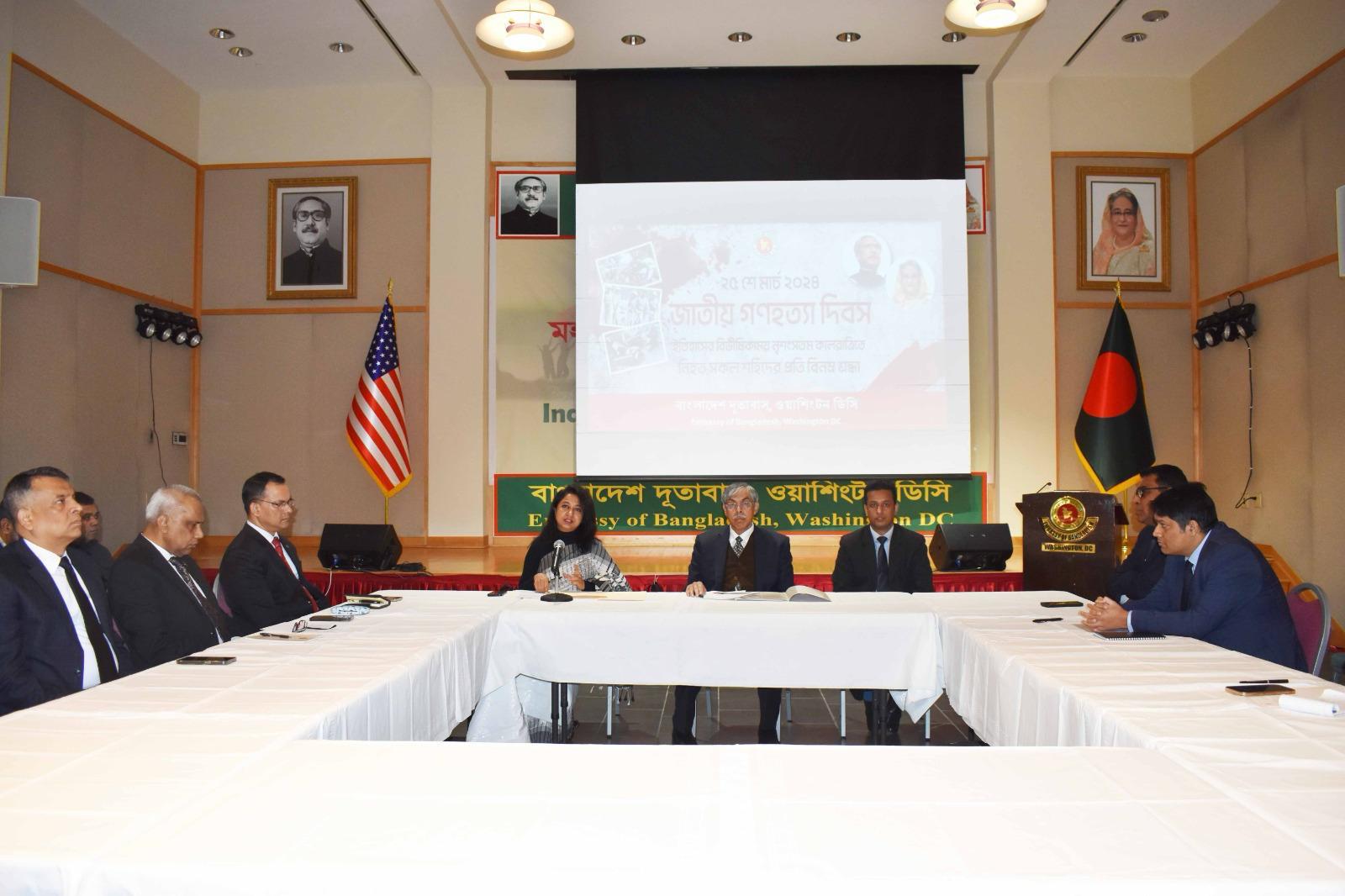“Genocide Day” observed at Bangladesh Embassy in Washington: Expose Pakistani Army’s March 25 atrocities before world community: Ambassador Imran

AZM Sajjad Hossain, Washington DC, — The Bangladesh Embassy in Washington DC observed the “Genocide Day” 25th March Monday in remembrance of the atrocities committed by the Pakistani Army on the unarmed Bangalees on March 25 in 1971 under the infamous “Operation Searchlight”.
The Embassy organized elaborate programs to pay deep homage to the martyrs who were brutally killed by the Pakistani Army on the black night of March 25 in 1971. The day’s programs began with observance of one-minute silence in memory of the martyrs of the Liberation War.
The messages issued on the occasion by Hon’ble President Mohammed Shahabuddin and Hon’ble Prime Minister Sheikh Hasina were read out by Defense Attache Brigadier General Md Shahedul Islam and Minister (Political) Md Rashedujjaman.
This was followed by screening of a documentary on the brutalities of the Pakistani Army in Bangladesh in 1971 and a seminar highlighting the importance of the day. Bangladesh Ambassador to the United States Mr. Muhammad Imran took part in the discussion on the seminar titled “Genocide in 1971’’, while Counsellor (Political) Arifa Rahman Ruma presented the keynote paper in it.
Taking part in the discussion, Ambassador Imran paid rich tributes to the greatest Bangalee of all time, Father of the Nation Bangabandhu Sheikh Mujibur Rahman, and three million martyrs of the Liberation War.
Describing the Pakistani Army’s atrocities on the 25th March in 1971 as one of the worst genocides in human history, he said the Pakistani military junta unleashed mass killings and destruction in Dhaka and other areas to execute their blueprint to crush the movement for independence of freedom-loving Bangalees and stop the Awami League from assuming office following its victory in the 1970 election.
Ambassador Imran called upon all including expatriate Bangladeshis to expose the Pakistani Army’s brutalities on the unarmed Bangalees on March 25 in 1971 and following nine months before the world community to get global recognition of the genocide.
Ambassador Imran said Bangabandhu formally proclaimed the independence of Bangladesh at the first hour of the 26th March in 1971 after the Pakistani Army’s barbaric attack. Under Bangabandhu’s undaunted leadership, Bangladesh achieved ultimate victory on December 16 in 1971 after the nine-month bloody war against Pakistan, he said.
The Ambassador requested all to work unitedly to build “Sonar Bangla” (Golden Bengal) as dreamt by Bangabandhu, and join the journey of establishing a “Smart Bangladesh” by 2041 under the leadership of Prime Minister Sheikh Hasina being imbued with the spirit of the Liberation War and ideology of the Father of the Nation.
While presenting the keynote paper at the seminar, Arifa Rahman Ruma narrated the Pakistani military junta’s atrocities and destruction on March 25 night in 1971 and following nine months in Bangladesh. She underscored the need for making coordinated efforts by all concerned to get the international recognition of the genocide in Bangladesh.
The programs ended with offering a special prayer seeking divine blessings for eternal peace of the departed souls of Father of the Nation Bangabandhu Sheikh Mujibur Rahman and the martyrs of the War of Liberation. First Secretary (Passport & Visa Wing) Muhammad Abdul Hye Milton conducted the programs.
